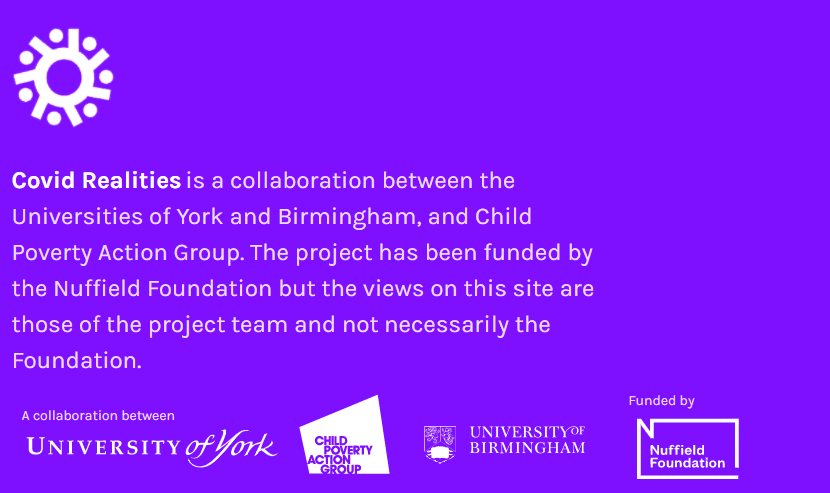
By: Shirley Widdop ![]() @Psychologicsal
@Psychologicsal
First published on Covid Realities on 10 July 2020
The United Kingdom (UK) is the 5th richest nation on Earth. Fortunately, we live in a society where we have access to a social security system that supports us when we fall on hard times. Looking after one’s citizens is the compassionate & right thing to do. But it is flawed & over the years, the spectre of poverty & deprivation has loomed large & continues to do so.
According to the Joseph Rowntree Foundation (JRF, 2019) currently over 14 million people are living in poverty. Of those, 4 million are actually in paid employment; 4 million are children & of the 14 million, 7 million people are living in a household where someone is disabled.
Much poverty has been driven by 10 years of Conservative-led austerity measures: benefits freezes, the two-child limit, 5 week wait times for Universal Credit first payments &, from personal experience, a disability assessment process that is neither valid or reliable & fails to understand the complexities that living with a chronic degenerative debilitating illness brings. Not to mention the insecurity of low paid zero hours contracts that have flourished as part of the “gig economy”.
Despite demonising rhetoric still pervading social discourse about those surviving on benefits, absolutely anyone can be swept into poverty through circumstances beyond their control. People like me.I went from being a married Registered General Nurse in the NHS, working full time with children & a mortgage, to a divorced, homeless lone parent living in a hostel after having fled the family home due to domestic abuse on unpaid maternity leave.
I was lucky – I was rehoused in a Housing Association-owned property. I returned to work, managing to find a childcare-suitable low paid job. But I slipped a disc in my neck & developed a condition called Degenerative Cervical Myelopathy (DCM) which, despite surgery to prevent further paralysis, was & remains incurable. At the time of writing I continue to deteriorate.
Unable to work, I applied to the Department of Work & Pensions for Employment Support Allowance (ESA) & Disabled Living Allowance (DLA) – subsequently replaced by Personal Independence Payment (PIP). I was refused each time, which plunged me into further debt. I went toTribunal & won 3 times, but it took a terrible toll on my mental health & my finances. I am now reliant on State support.
In 2020, prior to the COVID -19 Pandemic, the JRF proposed that the Minimum Income Standard for citizens in the UK – the amount of money that is required to achieve a minimum socially acceptable standard of living, as deemed by parents, that a single person needs to earn £19 200 & a couple with 2 children need to earn £18 700 each annually respectively.
The COVID Pandemic has exacerbated the situation, necessitating Government intervention via temporary increases in Tax Credits & Universal Credit levels & support for businesses having to furlough their staff. But people like me still on legacy benefits have not been included. Thankfully, my local Council has offered me a COVID-19 rebate on my Council Tax, which I am still obliged to pay as I am of working age, which is a relief. But consistency across the board would have been better, so that no one was left behind.
Financially, it has been “swings & roundabouts” pandemic-wise. I’ve seen the price of food go up. I’m having to bulk buy when I can because at the start of the pandemic, panic buying emptied the shelves early on. But it’s difficult; I don’t always have disposable income to do so. Exemplar; I am socially distancing, being potentially vulnerable. I needed to buy cat food. I found an online deal, but didn’t have the money for it. The following day when I did, the price had gone up from £16 to £60 overnight!.
Meanwhile, travelling less means lower fuel costs. But having family at home means increased costs due to meal provision, gas & electricity usage. And as I home educate my 15 year old, we are no longer eligible for free school meals.
I’ve seen many quantitative studies being conducted as a consequence of the pandemic – measuring reactions on a scale. Covid Realties with its qualitative approach, gives opportunities to ordinary people like me struggling financially to fully & easily express how they feel in whatever form suits them best in order to capture stories of everyday struggles, so those in power can be made to understand what life is like living on the breadline.
I have been very proud to participate in the pilot study & am looking forward to continuing throughout the study’s duration because as an “accidental activist” I am always looking for ways to hold our Government to account & the results, I believe, will provide a powerful way to influence future Government policy for the better, so that everyone can “level up” & flourish.
©️SALWiddop July 2020
About Covid Realities
Covid Realities is a research project looking into the experiences of parents and carers on low incomes during the pandemic.
Since February 2020, the COVID-19 pandemic has swept across the globe, causing suffering for millions. Here in the UK, we have had one of the highest death tolls in the World.
But it’s not just the virus that’s the problem.
The lockdown has seen the closure of businesses, local services and schools, causing serious economic hardship and stress.
This crisis affects everyone, but some more than others.
We know that people in low-income communities are more likely to become unwell.
We know that BAME communities have a higher risk of becoming seriously ill or dying from COVID-19.
And we also know that families living with children, and carers of children, face particular challenges, especially when they are trying to get by on low incomes.
But there is still more we need to find out – especially about how families living on a low income will manage during the next few months.
Covid Realities is a project by a research team from the universities of York and Birmingham, working in partnership with the Child Poverty Action Group.
We want to better understand the struggles of daily life for low-income families, and help policymakers make the right decisions.
We are also looking to help other researchers with their work in this important field, bringing together findings from a number of related studies and helping share key research messages.



